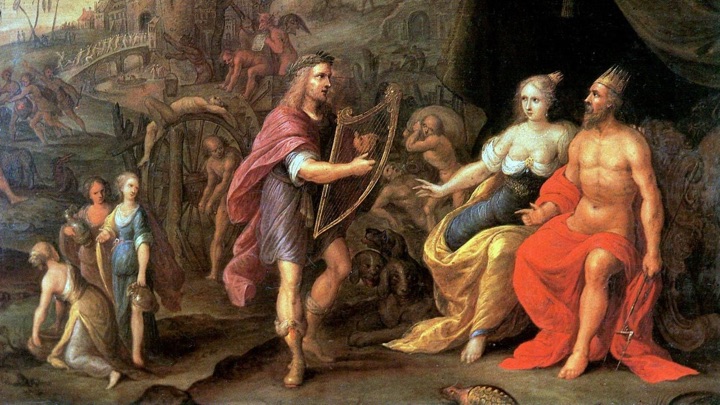
While the American Opera Society had begun presenting L’Incoronazione di Poppea locally in concert in the early 1950s, New York City Opera’s Orfeo began that company’s path to eventually producing all three of Monteverdi’s extant operas. The Met, to date, has presented none of them.
Orfeo was part of Stokowski’s second NYCO engagement. The previous season, he had led a staged double bill of Oedipus Rex and Carmina Burana. The Monteverdi (in its much shortened edition) was paired with Dallapiccola’s Il Prigioniero starring Norman Treigle.
Stokowski would, of course, debut at the Met the following January in the new Cecil Beaton Turandot with Birgit Nilsson and Franco Corelli. After 12 Puccini performances with the company, he would return only to lead a bit of Tannhäuser at the Gala Farewell to the old opera house.
Souzay famously sang just once with the Met: a single performance of the Count in Le Nozze di Figaro in 1965 when his Susanna was Raskin, his NYCO Euridice.
Forty years after Monteverdi’s, Rossi’s Orfeo premiered in Paris, one of the first operas performed in France. The Italian-born Cardinal Mazarin was determined to bring the new art form to the court of Louis XIII and his previous project was Sacrati’s La Finta Pazza in 1645 with the Rossi following two years later. Both works notably featured imported castrati, a phenomenon that didn’t catch on and indigenous French operas that would arise beginning in the early 1670s never included castrated men in their casts.
Rossi, whose music remains far too little known, had written just one opera before Orfeo: 1642’s Il Palazzo Incantato which lay unperformed for centuries before the Argentinian conductor Leonardo Garcia Alarcón fleshed out some missing sections and led its modern stage premiere in Dijon during the pandemic with his group Cappella Mediterranea.
Les Arts Florissants produced the first commercial recording of Orfeo and has also released several disks of Rossi’s sacred works which, now out of print, are very much worth hearing. My favorite Rossi recording, however, is “Le Canterine Romane” by the group Tragicomedia on Teldec which features some of the composer’s entrancing secular works for two or three female voices.NYC’s early music group TENET has also performed one of those ravishing pieces.
Juilliard Opera returns to action next week at the Peter Sharp Theater with what is being billed as the local stage premiere of Rossi’s L’Orfeo; does this mean that the work has previously been performed locally in concert?It will feature the school’s student period-instrument ensemble Juilliard 415 and be staged by Mary Birnbaum and conducted by Avi Stein.
Then, on November 23 the Met presents Matthew Aucion’s recent Eurydice set to Sarah Ruhl’s libretto (based on her play) starring Erin Morley, Joshua Hopkins, Jakub Josef Orlinski (in his Met debut) and conducted by Yannick Nézet-Séguin.
In other Orpheus opera news, René Jacobs who recorded Telemann’s Die wunderbare Beständigkeit der Liebe oder Orpheus 25 years ago returned to it last month for an extensive European concert tour.
Gluck’s opera about the mythological pair exists in several versions and Trove Thursday has posted Orfeo ed Euridice with Janet Baker and Pilar Lorengar, as well as Nicolai Gedda and Jeanette Pilou in Orphée et Eurydice.
Gedda returned to Orfeo for Haydn’s L’Anima del filosofo ossia Orfeo ed Euridice to search for Joan Sutherland in another Trove Thursday feature.
Monteverdi: La Favola d’Orfeo
New York City Opera
City Center
29 September 1960
Broadcast
Euridice: Judith Raskin
Messagera: Regina Sarfaty
La Musica: Doris Yarick
La Speranza: Joy Clements
Proserpina: Evelyn Sachs
Ninfa: Mary LeSawyer
Orfeo: Gérard Souzay
Caronte: Andrew Frierson
Plutone: Joshua Hecht
Apollo: Frank Porretta
Pastori: Maurice Stern, John Dennison
Conductor: Leopold Stokowski
Rossi: L’Orfeo—in English
Globe Theatre
9 November 2015
Broadcast
Orfeo: Mary Bevan
Euridice: Louise Alder
Aristeo: Caitlin Hulcup
Nutrice: Verena Gunz
Amore: Keri Fuge
Venere: Sky Ingram
Grace/Fate/Himeneo: Lauren Fagan
Grace/Fate: Jennifer Davis
Grace/Fate/Bacco: Emily Edmonds
Endimione/Caronte: Philip Smith
Satiro/Plutone: Graeme Broadbent
Momo/Vecchia/Giove: Mark Milhofer
Orchestra of the Early Opera Company
Conductor: Christian Curnyn
Both versions of Orfeo can be downloaded by clicking on the icon of a square with an arrow pointing downward on the audio player above and the resulting mp3 files will appear in your download directory.
In addition, more than 400 other podcast tracks are always available from Apple Podcasts for free, or via any RSS reader.
The archive which lists all Trove Thursday offerings in alphabetical order by composer was recently updated.



